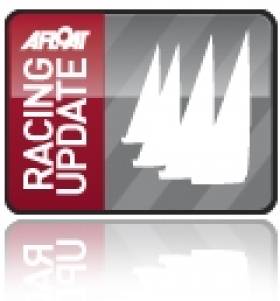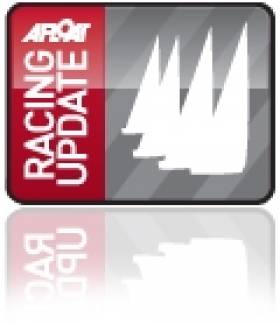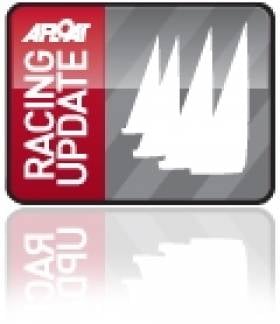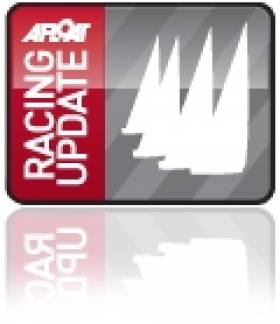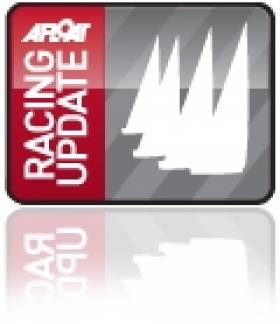Displaying items by tag: Ton
Kenefick Steers Chimp to Overall Win at Half Ton Classic Cup
Whilst there was disappointment at losing the two final races it was clear that all felt their Champions were worthy winners and at the prize giving Hampshire's Michael Kershaw and the crew of Chimp received a rousing reception as they claimed the trophy. Helmed by Cork's George Kenefick the crew also included Graeme Love, Ian Brown, Roger Merino and Ed Fitzgerald.

Helmsman George Kenefick from Royal Cork and Chimp crew pick up their prizes. Photo: Fiona Brown
Howth's King One skippered by Dave Cullen finished 14th, not having completed the final three races of the series.
Speaking after racing Michael Kershaw was both thrilled and a little surprised to find himself holding the trophy noting that his crew selection came about as much through luck as judgement and that they had never sailed together as a crew before the first race of the championship. He praised the outstanding quality of the competition and thanked the members and staff of the Royal Corinthian Yacht Club, Race Officer Rob Lamb and his team, the Half Ton Class and Richard and Ursula Hollis who led the Regatta Committee for what he described as a fantastic marker event for the class with so many boats. Certainly 38 boats is possibly the biggest gathering of Half Tonners ever, including the Half Ton Cups of the class's heyday in the 1980s.
Half Ton Classic Cup Day 4
Completing the podium line up were defending champion Philippe Pilate's French team aboard General Tapioca, a 1978 Berret, and Concorde, the 1989 Gautier design, owned by Francis Marshall from Cornwall. The battle for third between Concorde, Tim and David Cunliffe's Insatiable and Robbie Tregear's Per Eilsa had been fierce and Francis Marshall was thrilled to receive his third prize having beaten both boats by just 1.7 points. Insatiable claimed fourth on count-back with Per Elisa fifth.
In the Production Boat Division the winner was Francois Michelin's Chani, one of Ron Holland's wonderful Golden Shamrocks. In second place was the SJ32 Fletcher Lynd, owned by Fredric Denis, and Michael Langhan's Albin Ballad Strolch came third.
There were also plenty of humorous prizes including a bucket and spade for Sibelius who went aground on Ryde Sands, a No Parking sign for Red Cloud who took up temporary residence on one of the marks, and a Best Party Games book for Hullabaloo XV who were the last the leave the bar every night! Special prizes were also awarded to General Tapioca, Ian Van Burn's Fantasy and Toni Stuschek and Janne Tulokas' Blues in recognition of having competed in all five editions of the revival Half Ton Classic Cup.
Arguably one of the most important prizes of the entire event is the Half Ton True Spirit Trophy, which is awarded not to the winning team, but to the team that best represents the true spirit of camaraderie and competition in the Half Ton Classic Class. The members of the fleet elect the winner and by a massive number of votes the 2011 recipient was confirmed as Jean-Benoit Boels' Envol crewed by Diego Boels, Lionel Coquelet, Bert Jansen, Olivier Michel, Adrien Michele and Tom Jansen. At 11 years old Tom Jansen was also the youngest competitor and it was a lovely sight to see him proudly holding aloft the keeper prize, a unique canvas printed photograph by local photographer Hamo Thornycroft.
Class Chairman Bert Jansen concluded proceedings by once again thanking the 38 teams from seven nations for making the trip to Cowes and invited them to join him for the 2013 edition of the Half Ton Classic Cup, which will be held in France at a venue to be confirmed.
Kenefick Steering Chimp to Half Ton Success
Top Cork youth sailor George Kenefick at the helm of Chimp has tightened the strangle hold on the lead of the Half Ton Classic Cup and now has a 14-point margin over nearest rivals off Cowes. One time series leader Howth's King One, skippered by Dave Cullen, did not complete any of yesterday's races, dropping to 14th overall.
The old adage that things become better with age has never been more apt than in Cowes this week, where a 38 strong fleet of historic little yachts racing in the 2011 Half Ton Classic Cup supported by South Boats has been enjoying a wonderful fifth edition of this revival event. The boats may be old but their hearts are still strong and it's great to see not only superbly close racing on the water, but also the wonderful camaraderie of the crews ashore.
Today's fourth day of competition in the five-day regatta featured three more races, bringing the total number sailed to ten. With rain and no wind greeting the bleary eyed crews as they pulled back the curtains first thing Race Officer Rob Lamb made the judicious decision to hold everyone ashore until conditions improved. At 11.15 the fleet was sent afloat and by the time they came to the line for race eight in the series they had around 13 knots from the southwest and the sun was breaking through. Again the Race Committee was able to complete three races, the first two of which were windward leeward's and the third a round the cans race.
Once more it was cut and thrust on every leg of every race, both on the water and in the corrected time results. In the two windward leeward races Michael Kershaw's Chimp and Jean-Philippe Cau's Sibelius virtually match raced around the course. Chimp went on to win both races with Sibelius claiming second in both. In race eight David Evans' Hullabaloo XV just pipped Robbie Tregear's Per Elisa for third by 6 seconds. In race nine it was the turn of Philippe Pilate aboard reigning Half Ton Classic Cup champion General Tapioca to fill the final podium slot. In the tenth race Francis Marshall's Concorde, General Tapioca, Hullabaloo XV and Chimp were locked in battle and the final beat, right across the central Solent to finish on the Royal Corinthian Yacht Club's line in front of the spectators on the Parade, was a delight to watch. On the line the boats were so close that the competitors couldn't be certain of the corrected time positions and there was a frantic rush back to the club house to find out the results, which revealed that Concorde had won with General Tapioca second, Hullabaloo XV third and Chimp fourth.
In the overall standings Chimp has tightened her strangle hold on the lead and now has a 14-point margin over her nearest rival. Michael Kershaw has put together a strong young crew for Chimp at this event. On the helm is Ireland's George Kennefick, one of Ireland's top young sailors. For Geroge IOR sailing is in his blood (his father is the legendary Neil Kennefick of Quarter Ton Cup winner Manzanita fame) and he's been sailing Quarter Tonners and Half Tonners for several seasons. Also on the crew is Roger Merino, well known as one of the top Etchells crews and a regular member of the Chimp team. Graham Love and Ed Fitzerald who both have previous Half Ton Classic Cup experience and Ian Brown of Quantum complete the crew.
General Tapioca continues to hold second place and is now 18.3 points ahead of Concorde. Tim and David Cunliffe's Insatiable has dropped down into fourth place and are now tied on points with Per Elisa.
Two final races remain to be sailed and the regatta concludes tomorrow, Friday 26 August. The forecast is for more rain overnight and tomorrow morning with light winds during the first part of the day so the fleet has its fingers crossed that they can achieve two races before the 14.30 final start time cut off.
King One Gets off to Strong Start in Half Ton Cup
Ireland's only representative in the Half Ton Cup has opened his account with a third placing, David Cullen's King One from Howth Yacht Club was vying for the lead in the first race yesterday and with an early start this morning in a race around the Isle of Wight Cullen is again in the hunt in the offshore race that counts for double points.
For the 38 strong fleet assembled in Cowes for the 2011 Half Ton Classic Cup, supported by South Boats, today's opening three races were confirmation that the Half Ton Class continues to go from strength to strength. Throughout each of the day's three races the fleet was tightly packed with plenty of close quarters drama keeping both the sailors and the spectators on the edge of their seats.
The entry list represents a true cross section of the original Half Ton fleet with the oldest boat being the 1977 Davidson designed Waverider, owned by A Delvaus of Belgium, a double winner of the Half Ton Cup in 1978 and 1979 when skippered by Laurie Davidson himself. The newest boat in the fleet is the 1992 Caccerelli designed Per Elisa, owned by Britain's Robbie Tregear, which was the last of the grand prix Half Tonners ever built, launching in 1992.
Racing was initially postponed for two and a half hours whilst the fleet waited for wind but the wait was worth it with a nice 10-12 knots from 135 degrees filling in around lunchtime. The Race Committee, led by Race Officer Rob Lamb, was able to set up shop on the Hill Head Plateau and with judicious use of a relatively short windward leeward course they achieved three races that tested the teams to the full.
In the opening race Half Ton Class Chairman and defending champion Philippe Pilate's General Tapioca took an early lead on the water and on corrected time and despite the many attempts by Francois Michelin's Chani and Cullen's King One they held their lead through until the finish. On corrected time General Tapioca won by 34 seconds from Chani with King One taking third by just three seconds.
Race two went to Sibelius, owned by Jean-Philippe Cau who also took control of the race early on and then refused to relinquish their lead. Michael Kershaw's Chimp finished 57 seconds behind them with Tim and David Cunliffe's Insatiable three seconds behind that in third place. General Tapioca had to settle for fourth, just nine seconds behind Insatiable.
In race three General Tapioca came to the fore again, this time winning by ten seconds from Chimp with Denzil Williams' Santa Evita third and Robbie Tregear's Per Elisa fourth.
In the overall standings General Tapioca now leads the fleet by two points from Chimp who counts 8 points, with Sibelius third on 14 points, Chia fourth on 22 points and Insatiable fifth on 24 points.
The event also features a special division for Production Boats, which this year features two Hustler SJ30s, two MG HS 30s, a Golden Shamrock, an Albin Ballad, an X95 and a Hustler SJ32. Today's top performer in the Production Division was Francois Michelin's Golden Shamrock Chiani, which won the first two races and finished second in race three. Richard Hollis's X95 Crakajax now lies in second place thanks to a 3, 3, 1 score line with Frederic Denis' Fletcher Lynd, a Hustler SJ30 two points behind in third.
After racing Mike Relling, who is sailing aboard Insatiable with David and Tim Cunliffe, commented on the incredible quality of the racing. "It was very close and I think the good thing is that among the top ten boats there are only seconds between each place so mark roundings, boat handling, all of the little details are very, very important. I think that says a lot about the Half Ton Class, the success of the class and the success of IRC. The ratings seem to be pretty fair, and like any good regatta if you sail well you will do well, if you sail badly you will do badly and there's nowhere to hide. I think that makes it a fantastic event."
Today the fleet will be racing around the Isle of Wight. The start is scheduled for 07.30 from the Royal Corinthian Yacht Club start line off Cowes and the fleet will round the Island anti-clockwise. With a forecast for moderate to fresh winds, a double points weighting and a no discard on the score for the race we can anticipate another exciting day. The regatta continues until Friday 26 August with up to twelve races scheduled.
Howth's King One Among 38 Entries to Contest Half ton Classics Cup
The Half Ton Classic Class encourages owners to maintain their yachts in "as original" condition where ever possible which helps to ensure the boats can still race competitively against each other boat on boat as well as on handicap and also keeps the cost of competing in the class within reasonable bounds. The success of this formula is clear to see in the ever-increasing entry numbers for this biennial event. Special prizes are also awarded for the Series and Production boats to encourage as wide a range of competitors as possible.
Alongside title sponsor South Boats, the definitive builder of workboats for the offshore wind industry, the event is also generously supported by daily racing sponsors Wight Vodka, One Sails, Euro Car Parks, Spinlock and Best Water Technology. Local supporters include Goddards Brewery, Red Funnel/Isle of Wight Ferries, Shepards Wharf Marina, Kingston Marine Services and Ocean World/World Leisurewear.
Registration will take place on Sunday 21st August, followed by a Skippers Briefing and a Welcome Reception. Racing runs from Monday 22nd to Friday 26th August with daily prize giving and social events at the Royal Corinthian's delightful waterside clubhouse each evening. The Half Ton Classic Cup Regatta Dinner will take place at the club on Thursday 25th August when competitors will be joined by a number of special guests to celebrate the history and ongoing success of this unique class.
The competitor line up includes plenty of familiar faces as well as a number of new teams, which should make for an exciting competition. Following serious damage when she fell off her road trailer earlier this year there was some doubt as to whether the 1978 Jean Berret designed General Tapioca, winner of the past two Half Ton Classic Cups and owned by Belgium's Philippe Pilate, would be able to defend her title again this year. Fortunately repairs have been completed in time and she will be on the start line on Monday.
Others with an eye on podium positions include fellow 1978 Jean Berret design Blue Berrett Pi, owned by Xavier Van Der Ghinst of Belgium, which took 3rd place in the 2003 and 2005 Half Ton Cups and came 7th in 2007; King One, also designed by Jean Berret but this time as the prototype of the fantastically popular Evolution production boats, which won the 1981 Half Ton Cup with Paul Elvstrom as skipper and is now owned by Howth's David Cullen; Demolition a 1981 sister ship to Stephen Jones' legendary Smiffy which makes the trip to Cowes from Falmouth with owner Mel Sharp; David Evans' hugely successful Hullabaloo XV, a 1978 Stephen Jones Hustler 32 from the Walton Backwaters; and Sevcon Team Chia Chia, designed by Hugh Welbourne in 1984 and travelling from Liverpool to compete with owners Phil and Alex Eagleton and Nigel Waterhouse. The furthest travelled boats are Finland's Blues, owned by T Stuschek and J Tulokas, and Spain's Half' Capone, owned by Jean-Luc Courbon.
Click here for a full entry list.
Kenefick's Tiger Fourth at Cowes Quarter Ton Cup
With two races completed at the end of Day 1, only 7 points separate the top 6 teams at the Coutts Quarter Ton Cup . Rob Gray's 'Aquila' holds the overall lead with a total five points, tied with Louise Morton's 'Espada' in second. Rounding out the top three just one point adrift of 'Espada' is Rickard Melander's 'Alice II', who holds a 4 point advantage over Cork's George Kenefick's fourth placed 'Tiger'. Fifth at the end of Day 1 is 'Cote' owned by Darren Marston & Ollie Ophaus.
Day 1 of the Cup dawned bright and clear but with an almost total absence of the most necessary ingredient for a sailing regatta - wind. With the glassy conditions meaning that there was very little chance of racing getting away at the scheduled 10.30 start time, Principal Race Officer Robert Lamb sensibly held the fleet ashore whilst he and his race team headed off onto the Solent in search of some sort of usable pressure. Having persevered in their quest for some several hours, Lamb and his team were eventually rewarded for their patience at around 14.00, when a pleasant 10 knot south westerly breeze materialised, enabling the eager fleet to finally put to sea for what turned out to be two excellent and closely fought races.

Tiger - Lying fourth in Cowes. Photo: Bob Bateman
Despite the wide range of sizes and designs making up the 30 boat fleet, the racing could hardly have been closer both on the water and on handicap, with every startline and mark rounding fiercely contested throughout the day. In Race 1, Louise Morton's 'Espada', (helmed at this event by Colette Blair standing in for the injured Morton) turned in a line honours performance in the first race, which was good enough to also give 'Espada' a corrected time race win by just under a minute. Second in that race was last year's Quarter Ton Cup winner 'Cote' owned by Darren Marston & Ollie Ophaus, who edged Sweden's Rickard Melander on 'Alice II' into third place by just 16 seconds on corrected time. Fourth was Rob Gray's 'Aguila', ahead of Ireland's Eamonn Rohan on Anchor Challenge.
Race 2 saw a compelling three-way battle for line honours between 'Aguila', 'Alice II' and George Kenefick's Irish entry 'Tiger'. 'Aguila' eventually prevailed to take the gun and a narrow 8 second corrected time victory over 'Tiger' in second and 'Alice II' in third. 'Espada' rounded out a solid day with a fourth place ahead of Ian Southworth's 'Whiskers'.
With two races completed at the end of Day 1, only 7 points separate the top 6 teams. Rob Gray's 'Aquila' holds the overall lead with a total five points, tied with Louise Morton's 'Espada' in second. Rounding out the top three just one point adrift of 'Espada' is Rickard Melander's 'Alice II', who holds a 4 point advantage over George Kenefick's fourth placed 'Tiger'. Fifth at the end of Day 1 is 'Cote' owned by Darren Marston & Ollie Ophaus.
As the fleet returned to the dock this evening, the smiles on the faces of the sailors was a clear indication of a fun day of Quarter Tonner racing. Having travelled from Russia to compete in Cowes this week with his French Quarter Tonner 'Bullit', Dmitry Borodin said that he had thoroughly enjoyed his first experience of racing in England. "To have the chance to sail here in Cowes is a real pleasure. There are so many fantastic boats and just being here in a town with this sort of sailing heritage is fantastic. On the water I think we have much to learn but we are enjoying our first Quarter Ton Cup and we will take the message back home with us. Hopefully in years to come there will be more Russian boats coming to sail in this regatta."
Colette Blair from 'Espada' declared herself happy with her team's first day performance. "We are fortunate that Espada performs well in all conditions, but today we seemed to be going well and we are pleased with the way we sailed." Blair also commented that Espada's only non-female crew member, mainsheet trimmer Stuart Childerley, had coped well with being the only man on-board. "It's great to sail with Stuart although I think he found the general conversation onboard today rather different to what he is used to."
Anchor Challenge's Eamonn Rohan, a first timer at the Quarter Ton Cup, had also clearly enjoyed his day on the water but was quick to pay tribute to the quality of the fleet. "This is the toughest Quarter Ton racing that we have done since we bought the boat. There are so many really fast boats and competitive crews sailing here this week, it's been a bit of an eye opener. We are having fun though and looking forward to tomorrow's racing."Despite lying in last place overall Richard Johnson & Sarah Lyle on 'Hannah J' were still amongst the most enthusiastic owners checking the results in the clubhouse after racing. "We had a great day out on the water and we are really pleased not to have finished last in the second race! Can you tell this is our first time? What we are really hoping for is an overall wooden spoon prize!" commented Sarah.
Racing at the 2011 Quarter Ton Cup continues tomorrow Tuesday 12 July with three more races scheduled. The regatta concludes on Wednesday 13 July.


























